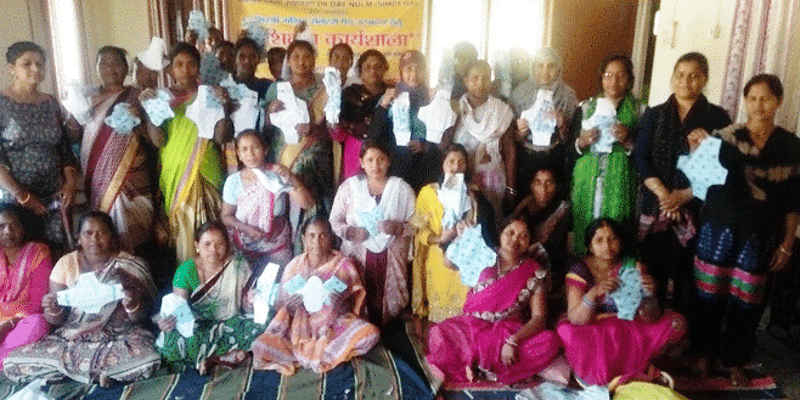Jharkhand women show the way with eco-friendly sanitary pads
A campaign run by Simdega district administration in Jharkhand, in collaboration with the United Nations Water Supply and Sanitation Collaborative Council, is training women on manufacturing and using bio-degradable sanitary napkins.
If a campaign run by a group of women in Jharkhand’s Simdega district gains momentum, Indian women, especially those from rural areas, will soon ward off a taboo that continues to hinder their progress in some ways.
A campaign launched by the Simdega district administration in May 2019, in collaboration with United Nations Water Supply and Sanitation Collaborative Council, will be training 3,000 women on using eco-friendly, plastic-free and bio-degradable sanitary pads.
Named ‘Missi Garima Pads’, the pads have been made accessible to women in the village at local markets.

The women who have come together to make the eco-friendly Missi Garima sanitary pads. (Image: NDTV)
Missi Garima Pads consist of four layers of cotton cloth that are stitched together, and can be washed and reused. Each pad takes 10-15 minutes to stitch and is completely chemical-free. A packet of eight pads costs Rs 30-Rs 50.
Speaking to NDTV, Biswambharnath Naik, aspirational district fellow of NITI Aayog, said,
“This district is majorly rural, with a population of 2.5 lakh menstruating girls and women. We found that most girls and women here did not have any awareness about the use of sanitary napkins. They were using pieces of sack and cloth to soak menstrual blood. It was shocking to see that they sometimes re-used cloth and other material used as absorbents, without washing and drying them properly.”
He further added that most of these women hid the washed and wet rags within their clothes to avoid embarrassment. The aim of the campaign is to make women aware of more hygienic and safer options available in the market, Naik said.
“We realised that making them aware was not enough, so we decided to plan an intensive intervention programme across the district and change the habit of using cloth. This is how we started Garima Abhiyan.”
Women have now formed more than 100 Self-Help Groups (SHGs), which are now manufacturing 100-150 bio-degradable sanitary pads per day.
One of the beneficiaries, Rahil Dungdung, told NDTV, “Thanks to Missi Garima Pads, we are now able to talk about menstruation with each other and with men too. This campaign has helped me in not only learning about such a crucial part of my life but has also made me financially stronger”.
(Edited by Javed Gaihlot)
Do you have an interesting story to share? Please write to us at [email protected]. To stay updated with more positive news, please connect with us on Facebook and Twitter.







